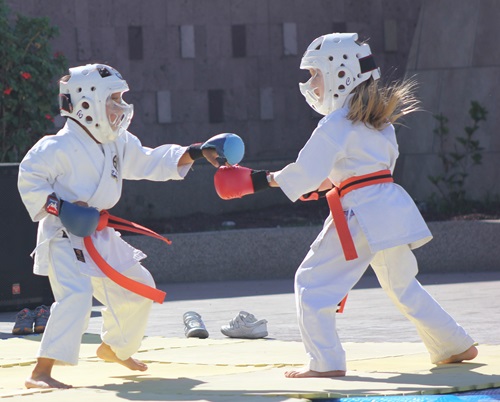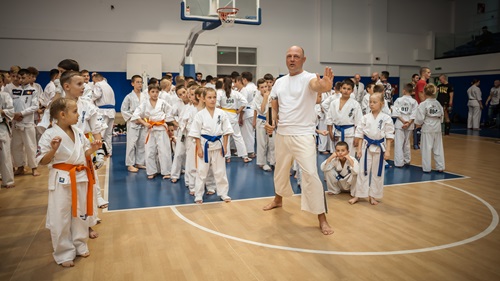
Across the country, after-school child care programs have become extremely limited, particularly since the pandemic, leaving anxious parents searching for solutions. For example, Denver7, an ABC affiliate, reported that in a recent study released by the Bell Policy Center last year, there were about 246,000 kids in Colorado under the age of 6 who had working parents, while licensed providers in the state only had the capacity to serve about 152,000. That left a gap of 94,000 elementary school children who needed something constructive to do for a couple of hours, from mid-afternoon when schools let out, to around 5:00 P.M. when parents could leave work to pick them up.
As it turns out, martial arts schools, which excel at keeping kids safe, engaged, and having fun, are filling the need for after-school programs. An IBISWorld study found that there were 66,124 Martial Arts Studios businesses in the U.S. as of 2023, an increase of 10.1 percent from 2022. It stands to reason that there are an increasing number of dojos that are eager to offer after-school programs.
 Moreover, Statista reports that the popularity of martial arts continues to increase across the U.S. Between 2010 and 2023, the total number of people practicing martial arts rose by 31 percent to about 6.6 million participants.
Moreover, Statista reports that the popularity of martial arts continues to increase across the U.S. Between 2010 and 2023, the total number of people practicing martial arts rose by 31 percent to about 6.6 million participants.
Denver7 reports that Peak Martial Arts in Thornton, Colo., has been teaching students of all ages for more than two decades, and in 2023 began offering after-school programs from Monday through Friday, which include snack time, guided study when needed, and of course, martial arts training. Enrolled students are picked up at the end of their school day and transported to the studio where they partake in structured activities until their parents can fetch them.
Meanwhile, in Howard County, part of the Baltimore metro area, the Okinawan Karate Dojo in Ellicott City has about 40 elementary-school kids in its after-school care program. The dojo has proven to be a very popular option among the parents of students in the area grade schools, reports Hugo Kugiya of The Baltimore Banner. “The program is among many in the county licensed by the state’s Division of Early Childhood, but as a martial arts school, the dojo is a rare bird among the group. Acquiring a license from the state requires, among other things, taking face-to-face orientation training, submitting an extensive application that includes background checks for staff, and inspection by fire and health department officials.”
Similarly, in Olympia, Wash., The Jolt News Organization pointed out that the Paramount Martial Arts After School Karate program is open to all nearby elementary schools and includes after-school pick-up, homework and reading time, and karate classes. Ditto in Las Vegas, where Shoshinkan Martial Arts, a dojo and non-profit, teaches kids discipline, self-defense and self-confidence. It started an after-school program at Leavitt Middle School and wants to launch more programs throughout the Clark County School District.
 However, not everyone is a fan of this trend. At Ancient Ways Martial Arts in Bradenton, Fla., programs for preschoolers and kids are offered, as are birthday parties and summer camps. But no after-school care options. Founder and grandmaster Boon Brown used to offer an after-school program, but decided it was a bad idea.
However, not everyone is a fan of this trend. At Ancient Ways Martial Arts in Bradenton, Fla., programs for preschoolers and kids are offered, as are birthday parties and summer camps. But no after-school care options. Founder and grandmaster Boon Brown used to offer an after-school program, but decided it was a bad idea.
“For 13 years I had an after-school program, a really big one. Three vans, lots of staff, picking up 40 to 50 kids per day. It’s lucrative, but it also makes your martial arts school much worse,” Brown explains in an article titled, “Why We Don’t Have an After-School Program,” posted on his website. He goes on to explain the many pitfalls such as vehicle costs, insurance and additional liability costs, staffing expenses, state licensing and certification requirements, and other assorted headaches. Once he eliminated the program, he says, “Our classes got better. Our students got better. Our program made more money and everyone was happier.”
There is no doubt that martial arts training teaches discipline, respect, self-confidence and responsibility, and many after-school programs become an additional pipeline for students and a growth opportunity for the business. However, adding the element of child care to a dojo requires serious consideration. Certainly, there is great demand for such programs, and millions of kids need after-school care but don’t have access to it. While some cities and states provide public funding for after-school care, many are falling short. But for now, many martial arts schools are happy to kick their after-school efforts into high gear and become part of the solution.

